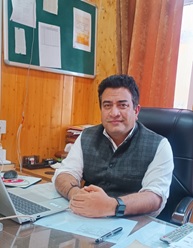In recent years, the issue of mental health has gained profound attention worldwide, affecting individuals, families, and communities. Kashmir Valley, too, has witnessed a considerable upsurge in mental health cases, prompting experts to emphasize the importance of a comprehensive approach to address this pressing concern.
Mental health encompasses a wide range of conditions, including anxiety disorders, depression, schizophrenia, bipolar disorder, and PTSD. Dr. Maqbool Ahmad Dar, Head of the Psychiatry Unit at Government Medical College (GMC) Srinagar, noted the significant increase in the number of patients seeking mental health treatment. This shift, he explained, is due to increased awareness and knowledge about mental health issues among the general population.
Kashmir Valley currently has two government-run institutions providing mental health services: the Psychiatric Institute at Kathidarwaza Srinagar and the Psychiatry unit at SMHS Srinagar. Dr. Maqbool highlighted the services offered at GMC, which include treatment for addiction and an outdoor patient department for general psychiatry and child psychiatry. He also mentioned the prevalence of psychiatric patients seen by neurologists and cardiologists.
Experts believe that the mental health infrastructure in Kashmir has seen significant improvements and is now on par with the best psychiatry units in the country. Dr. Maqbool mentioned that the Electroconvulsive Therapy (ECT) section at GMC is better than that of PGI Chandigarh, demonstrating the progress made in mental health care infrastructure.
To extend their reach, mental health professionals in Kashmir have successfully launched Tele-Psychiatry services, providing patients with access to counselors, psychiatrists, and psychologists through online and offline initiatives.
In line with the global observance of Mental Health Day, psychiatry departments in Kashmir conduct awareness programs and camps to disseminate information and raise awareness among the public, especially in schools and universities.
Experts noted gender differences in mental health diagnoses, with conditions like bipolar disorder being common among both men and women. Depression, on the other hand, is more prevalent among women, potentially due to hormonal changes and societal factors.
Dr. Yasir Rather, Professor of Psychiatry at GMC Srinagar, highlighted the impact of changing lifestyles, isolation, and materialistic cravings on the upsurge in mental health issues. He stressed the importance of reducing stigma, promoting open conversations, and implementing mental health education programs in schools and workplaces. Dr. Rather emphasized the need for accessible mental health services and expanded telehealth options to reach underserved populations.








